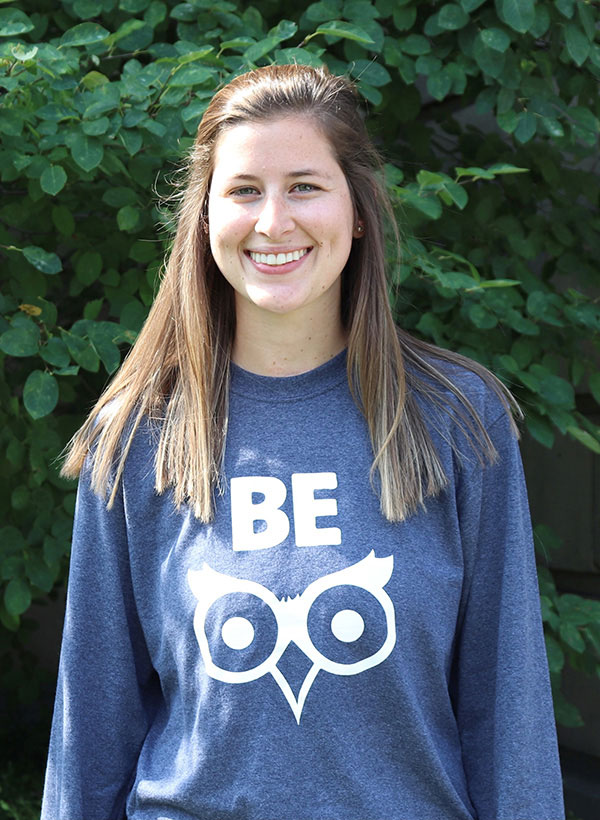
As a Navy Corpsman, Emily trained in San Antonio, Texas, before assignments at Walter Reed in Bethesda, Maryland, and the Naval Medical Center in San Diego, California, during her six-year Navy career. Her husband Nicholas came with her to every post and completed his undergraduate education fully online. When he was admitted to Syracuse Law School, Emily had one year left in her military commitment. Nicholas deferred entry for a year while Emily finished her service and considered options in higher education. She had started her nursing degree and was planning to become a public health nurse but didn’t have a great passion for the nursing part so much as the public health part. That’s when she and Nicholas went on their trip to Bali.
“We saw a man with a Syracuse shirt on, which is unusual to see in that part of the world,” she says. “When we talked to him, it turns out he was on the board of directors for the IVMF [D’Aniello Institute for Veterans and Military Families]. He said I have to check out Syracuse. I was pretty dead-set on going to nursing school to become a public health nurse, but I looked into Syracuse’s public health program because of him. I’m glad I made the decision to switch.”
Emily and Nicholas are both natives of Watertown, New York, and Emily says she never really considered attending Syracuse as an option. Emily’s older sister is a nurse who also started her career as a Navy corpsman. Emily became interested in joining the Navy at a young age after attending her sister’s boot camp graduation.
“I was so inspired. That was all I wanted to do,” she says. “I never even considered college. I thought I would be a Navy corpsman and become a nurse, but it’s been nice to do my own thing.”
Emily got the Navy corpsman part done, heading out for boot camp only 10 days after high school graduation. Her job was to support nurses and strongly aligned with health education. She realized public health was a better fit for her and took the opportunity to reconsider her path when she discovered new options at Syracuse.
“My advisor Maureen Thompson is incredible. She’s always been really communicative and such a great contact,” Emily says. “She sat down with me and found how I could utilize credits from my military experience, and we created a whole schedule from when I started through graduation.”
Emily graduates this May from the Falk College with a degree in public health with a concentration in health education. She has one year left in her 4+1 program and plans to finish her master’s degree next year. She and Nicholas have embraced life on campus as military-connected students. One interesting aspect of their post-service lives is they have taken up beekeeping. Emily says she appreciates how inclusive Syracuse has been for military spouses like Nicholas, as well as for older, non-traditional students, because she realizes spouses give up a lot to follow their service members. Importantly, Emily also has found meaningful connections through the veteran and public health communities on campus.
“I’m all about community, which is interesting to see, because when I got out of the military, I really felt like the transition is harder than people let you know,” she says. “After six years, every day you’re surrounded by people who completely understand this niche aspect of the world. You get out, and it no longer becomes your whole identity. It becomes a piece of you, and you have to figure out the other part. I really miss that connection, so public health has given me the opportunity to create community. I feel like I’ve found my place again after being a little disheveled after leaving the military.”
Emily works as a Barnes Center at The Arch peer educator on campus and tries to keep the veteran community engaged and involved with as many resources as she can. For example, she helps to educate her peers on college-specific behaviors, nutrition, healthy relationships, sexual health, mental health and harm reduction strategies for substance use. She chaired the Take Back The Night planning committee, which empowers survivors to stand up against sexual relationship violence. She also runs the Orange Recovery program, for students in recovery from substance use disorder.
“I love outreach and creating a community on campus, whether it’s for recovery or sexual/relationship violence survivors. I know the veteran community is at higher risk for these issues, which is why I try to always send the resources over to the veteran’s community,” she says. “It’s really incredible to see how I’ve fallen into public health. I’ve always felt like I’m making an impact. It’s giving people tools and resources to use when they need it most, and I hope to keep making a difference.”
~ A Syracuse University News story by Stephanie Salanger originally published on Monday, May 2, 2022.
